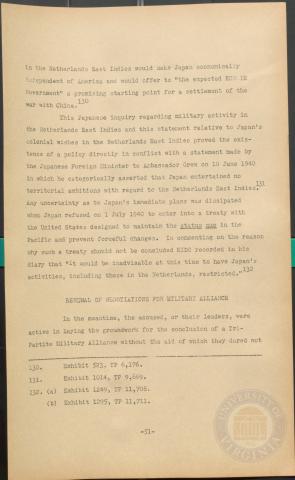
Page 51
| Parent | Japanese - German - Italian Collaboration |
|---|---|
| Date | |
| Language | English |
| Collection | Tavenner Papers & IMTFE Official Records |
| Box | Box 14 |
| Folder | Japan, Germany, Italy Collaboration and Introduction |
| Repository | University of Virginia Law Library |
in the Netherlands East Indies would make Japan economically independent of America and would offer to "the expected KONuYE
Government" a promising starting point for a settlement of the
war with China. 130
This Japanese inquiry regarding military activity in the Netherlands East Indies and this statement relative to Japan1 s colonial wishes in the Netherlands East Indies proved the exis¬tence of a policy directly in conflict with a statement made by the Japanese Foreign Minister to Ambassador Grew on 10 June 1940 in which he categorically asserted that Japan entertained no territorial ambitions with regard to the Netherlands East Indies. 131
Any uncertainty as to Japan's immediate plans was dissipated
when Japan refused on 1 July 1940 to enter into a treaty with
the United States designed to maintain the status quo in the
Pacific and prevent forceful changes. In commenting on the reason
why such a treaty should hot be conc3.uded KIDO recorded in his
diary that "*t would be inadvisable at this time to have Japan's
activities, including those in the Netherlands, restricted." 132
RENEWAL OF NEGOTIATIONS FOR MILITARY ALLIANCE
In the meantime, the accused, or their leaders, were active In laying the groundwork for the conclusion of a Tri- Partite Military Alliance without the aid of which they dared not
130.Exhibit 523, TP 6,176
131.Exhibit 101, TP 9,669
132.(a) Exhibit 1249, TP 11,708
(b)Exhibit 1295, TP 11, 711
